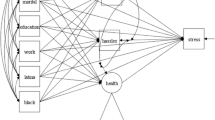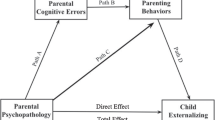Abstract
Research has consistently found associations among parenting practices, socioeconomic disadvantage, ethnicity and conduct problems in children. We investigated whether parenting practices might mediate the relation between ethnicity and conduct problems and the relation between socioeconomic status (SES) and conduct problems. The subjects were 141 clinic-referred children between the ages of 6 and 17 and their primary custodial parents. Using multiple indicators for each construct, except ethnicity, the mediational role of parenting was tested using structural equation modeling. The results indicated that the effects of SES on conduct problems was largely mediated by the influence of ineffective parenting practices. In contrast, ethnicity was not associated with conduct problems in this clinic-referred sample, even prior to controlling for SES and parenting practices, suggesting that the link between minority status and conduct problems may be dependent on the demographic characteristics of the sample. Exploratory analyses also revealed that there were ethnic differences in the types of parenting practices that were most strongly associated with conduct problems.
Similar content being viewed by others
REFERENCES
Achenbach, T. M. (1991). Manual for the Child Behavior Checklist/4–18 and 1991 profile. Burlington, VT: University of Vermont Department of Psychiatry.
American Psychiatric Association. (1987). Diagnostic and statistical manual of mental disorders (3rd ed. rev.). Washington, DC: Author.
American Psychiatric Association. (1994). Diagnostic and statistical manual of mental disorders (4th ed.). Washington, DC: Author.
Baumrind, D. (1972). An exploratory study of socialization effects on black children: Some black-white comparisons. Child Development, 38, 291–327.
Bierman, K. L. & Smoot, D. L. (1991). Linking family characteristics with poor peer relations: The mediating role of conduct problems. Journal of Abnormal Child Psychology, 341–356.
Cohen, P., Cohen, J., Kasen, S., Velez, N. C., Hartmark, C., Johnson, J., Rojas, M., Brook, J., & Steuning, E. L. (1993). An epidemiological study of disorders in late childhood and adolescence: I. Age and gender specific prevalence. Journal of Child Psychology and Psychiatry, 34, 851–867.
Colder, C. R., Lochman, J. E., & Wells, K. C. (1997). The moderating effects of children's fear and activity level on relations between parenting practices and childhood symptomology. Journal of Abnormal Child Psychology, 25, 251–263.
Conduct Problems Prevention Research Group (1992). A developmental and clinical model for the prevention of conduct disorder: The FAST Track Program. Development and Psychopathology, 4, 509–527.
Deater-Deckart, K., Dodge, K.A., Bates, J.E., & Pettit, G. S. (1996). Physical discipline among African-American and European-American mothers: Links to children's externalizing behaviors. Developmental Psychology, 32, 1065–1072.
Dishion, T. J., Patterson, G. R., Stoolmiller, M., & Skinner, M. L. (1991). Family, school and behavioral antecedents to early adolescent involvement with antisocial peers. Developmental Psychology, 27, 172–180.
Dodge, K.A., Pettit, G.S., & Bates, J.E. (1994). Socialization mediators of the relation between socioeconomic status and child conduct problems. Child Development, 65, 649–665.
Dumas, J. E., & Wahler, R. G. (1985). Indiscriminate mothering as a contextual factor in aggressive-oppositional child behavior: “Damned if you do and damned if you don't”. Journal of Abnormal Child Psychology, 13, 1–17.
Elder, G. H., Nguyen, T. V., & Caspi, A. (1985). Linking family hardship to children's lives. Child Development, 56, 361–375.
Fabrega, J. H., Ulrich, R., & Mezzich, J.E. (1993). Do Caucasian and black adolescents differ at psychiatric intake? Journal of American Academy of Child and Adolescent Psychiatry, 32, 407–413.
Forehand, R., Miller, K.S., Dutra, R., & Chance, M.W. (1997). Role of parenting in adolescent deviant behavior: Replication across and within two ethnic groups. Journal of Consulting and Clinical Psychology, 65, 1036–1041.
Frick, P.J. (1994). Family dysfunction and the disruptive behavior disorders: A review of recent empirical findings. In T.H. Ollendick & R. Prinz (Eds.), Advances in clinical child psychology,(Vol. 16, pp. 203–226). New York: Plenum.
Frick, P. J. (1998). Conduct disorders and severe antisocial behavior. New York: Plenum.
Frick, P. J. (1991). The Alabama Parenting Questionnaire. Unpublished manuscript, University of Alabama.
Frick, P.J., Christian, R., & Wootton, J. M. (1999). Age trends in the association between parenting practices and conduct problems. Behavior Modification, 23, 106–128.
Frick, P.J., Lahey, B.B., Hartdagen, S., & Hynd, G.W. (1989). Conduct problems in boys: Relations to maternal personality, marital satisfaction, and socioeconomic status. Journal of Clinical Child Psychology, 18, 114–120.
Frick, P.J., Lahey, B.B., Loeber R., Stouthamer-Loeber, M., Christ, M.G., & Hanson, K. (1992). Familial risk factors of oppositional defiant disorder and conduct disorder: Parental psychopathology and maternal parenting. Journal of Consulting and Clinical Psychology, 60, 49–55.
Gray-Ray, P., & Ray, M. C. (1990). Juvenile delinquency in the black community. Youth & Society, 22(1), 67–84.
Hatcher, L. (1994). A step-by-step approach to using the SAS system for factor analysis and structural equation modeling. Cary, NC: SAS Institute.
Hauser, R. M., & Featherman, D. L. (1977). The process of stratification. New York: Academic Press.
Jarrett, R.L. (1997). African-American family and parenting strategies in impoverished neighborhoods. Qualitative Sociology, 20, 275–288.
Kamphaus, R.W., & Frick, P.J. (1996). The clinical assessment of children's emotion, behavior, and personality. Boston: Allyn & Bacon.
Lahey, B. B., Loeber, R., Hart, E. L., Frick, P. J., Applegate, B., Zhang, Q., Green, S. M., & Russo, M. F. (1995). Four-year longitudinal study of conduct disorder in boys: Patterns and predictors of persistence. Journal of Abnormal Psychology, 104, 83–93.
Larzelere, R. E., & Patterson, G. R. (1990). Parental management: Mediator of the effect of socioeconomic status on early delinquency. Criminology, 18, 301–323.
Lempers, J.D., Clark-Lempers, D., & Simons, R. L. (1989). Economic hardship, parenting, and distress in adolescence. Child Development, 60, 25–39.
Loeber, R., & Stouthamer-Loeber, M. (1986). Family factors as correlates and predictors of juvenile conduct problems and delinquency. In M. Tonry & N. Morris (Eds.), Crime and justice: An annual review of research (pp. 29–149). University of Chicago Press: Chicago.
Lytton, H. (1990). Child and parent effects in boys' conduct disorder: A reinterpretation. Developmental Psychology, 26, 683–697.
McLeod, J. D. & Shanahan, M. J. (1993). Poverty, parenting and children's mental health. American Sociological Review, 58, 351–365.
McLoyd, V.C. (1990). The impact of economic hardship on black families and children: Psychological distress, parenting, and socioemotional development. Child Development, 61, 311–346.
Patterson, G.R., Reid, J.B., & Dishion, T.J. (1992). Antisocial boys. Eugene, Oregon: Castalia.
Peeples, F., & Loeber, R. (1994). Do individual factors and neighborhood context explain ethnic differences in juvenile delinquency. Journal of Quantitative Criminology, 10, 141–157.
Sansbury, L. L., & Wahler, R. G. (1992). Pathways to maladaptive parenting with mothers and their conduct disordered children. Behavior Modification, 4, 574–592.
Shaffer, D., Fisher, P., Piacentini, J. C., Schwab-Stone, M., & Wicks, J. (1992) NIMH Diagnostic Interview Schedule for Children, Version 2.3. New York: Columbia University.
Shelton, K. K., Frick, P. J., & Wootton, J. (1996). Assessment of parenting in families of elementary school-age children. Journal of Clinical Child Psychology, 25, 317–329.
Smith, C., & Krohn, M.D. (1995). Delinquency and family life among male adolescents: The role of ethnicity. Journal of Youth and Adolescence, 24, 69–93.
Strassberg, Z., Dodge, K.A., Petit, G.S., & Bates, J.E. (1994). Spanking in the home and children's subsequent aggression toward kindergarten peers. Development and Psychopathology, 6, 445–461.
Wahler, R.G. (1997). On the origins of children's compliance and opposition: Family context, reinforcment, and rules. Journal of Child and Family Studies, 6, 191–208.
Wahler, R.G., & Sansbury, L.E. (1990). The monitoring skills of troubled mothers: Their problems in defining child deviance. Journal of Abnormal Child Psychology, 18, 577–589.
Wauchope, B., & Straus, M.A. (1990). Physical punishment and physical abuse of American children: Incidence rates by age gender, and occupational class. In M. A. Straus & R.J. Gelles (Eds.). Physical violence in american families (pp. 133–148). New Brunswick, NJ: Transaction Publishers.
Westendrop, F., Brink, K. L., Roberson, M. K., & Ortiz, I. E. (1986). Variables which differentiate placement of adolescents into juvenile justice or mental health systems. Adolescence, 21, 23–37.
Wilson, H. (1987). Parental supervision re-examined. British Journal of Criminology, 27, 275–301.
Wootton, J.M., Frick, P.J., Shelton, K.K., & Silverthorn, P. (1997). Ineffective parenting and childhood conduct problems. Journal of Consulting and Clinical Psychology, 65, 301–308.
Author information
Authors and Affiliations
Corresponding author
Rights and permissions
About this article
Cite this article
McCoy, M.G., Frick, P.J., Loney, B.R. et al. The Potential Mediating Role of Parenting Practices in the Development of Conduct Problems in a Clinic-Referred Sample. Journal of Child and Family Studies 8, 477–494 (1999). https://doi.org/10.1023/A:1021907905277
Issue Date:
DOI: https://doi.org/10.1023/A:1021907905277




